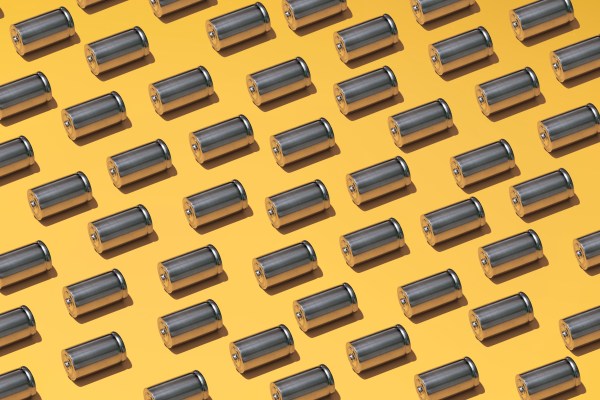“Batteries are hard,” an expert once said.
He wasn’t kidding. Designing and manufacturing pouches, slabs or cylinders filled with volatile chemicals that are capable of recharging ever more quickly is far from easy. Just ask LG, which had to pay GM nearly $2 billion for a costly manufacturing defect that saw every Chevy Bolt recalled.
It gets even harder when you consider the realm of possibilities. There’s a range of materials that can store electrons and tweaking their amounts only expands the number of combinations.
“Whenever you have a new battery that needs to be designed, there’s a huge design space, almost limitless design space,” Kaixiang Lin, co-founder and CEO of Chemix, told TechCrunch+.
Years ago, new battery types were discovered by chemists laboring away at benches, testing different combinations. They were guided by an in-depth understanding of electrochemistry, decades of previous research and a hefty amount of intuition. They made great strides relying on that combination. But as batteries have spread throughout society, the need for new and specialized chemistries has only grown.
Enter artificial intelligence. Battery companies have started to turn to machine learning to understand how batteries degrade over time, how they might charge faster and even which combination of materials might produce a better cell. The move toward specialization is creating more niches for startups. It’s also a transition that appears to be driving parts of the early-stage battery industry to behave more like the software sector: quick to scale, and possibly, quick to fail.
Chemix is hoping that by building a company that’s entirely focused on applying AI to battery development, it’ll be able to create a moat that’s broad and deep enough to let it stay ahead of its competition.
Lin and co-founder Jason Koeller, who serves as CTO, founded Chemix in 2021 and participated in UC Berkeley’s SkyDeck accelerator. Now, the company has raised a $10 million seed round from Mayfield Fund, Ibex Investors and Radical Ventures, TechCrunch+ has exclusively learned. Chemix is valued at $37 million post-money, according to PitchBook data.
The company uses data and software to crank out novel cell designs that it hopes will allow it to serve a wide range of customers. Lin likened his company’s approach to Nvidia, which designs advanced logic chips while letting other companies (mainly TSMC) produce the physical product.
“We focus on the high value-add step that is, I would say, the most challenging step: zero to one, how to come up with a battery design because of the limitless design space,” he said. “We basically leverage AI/ML to speed up the development process to find the most optimum design.”
Once Chemix finds a selection of possible combinations, it sets to work making them. “We use our in-house pilot production capacity, and then basically try different materials.” Once made, Chemix scientists then run the cells through a series of tests, feeding the results into a second AI system that makes predictions about performance and longevity.
“For us, if we’re really serious about AI, we should build and collect our own data,” Lin said.
That data has led the startup to a finished prototype, too. Chemix started working on a new cell for UBCO, an electric motor bike company, in June 2022. The goal was to produce a cell without cobalt and nickel. By the end of the year, Chemix had a large-format cell that would fit into UBCO’s existing pack designs. Three months later, the startup built more cells to fill out the pack.
Lin said that Chemix will design and sell batteries under its own name; it won’t white-label them for customers. As a result, its revenue will come from selling batteries to other companies, not from licensing designs or taking royalties off sales.
The new funding will allow the company to continue exploring the broader electric vehicle market (meaning not just cars and trucks) and reach out to potential customers to determine their needs for new battery designs.
The use of AI in battery design and development is nothing new, but given the size of Chemix’s seed round, it’s likely that the trend is starting to rewrite the rules of the battery industry.
It shouldn’t come as a surprise: The trend has been toward increasing specialization, one which is both enabled and perpetuated by technologies like machine learning. Over a decade ago, battery startups with novel designs did pretty much everything, including building supply chains, gigafactories, distribution networks and so on. But after that model proved onerous, they began specializing in distinct parts of the battery that would benefit from breakthrough materials: think silicon anodes and solid-state electrolytes.
Now, we’re seeing a further evolution. The new model doesn’t necessarily compete head-to-head with the most recent round of innovators — companies like Sila are unlikely to be displaced anytime soon. Instead, we’re seeing a deeper focus on the design side, eschewing manufacturing altogether. By outsourcing the manufacturing, Chemix is essentially minimizing its later-stage risks. It won’t have to worry about making the transition from nimble, lab-based startup to large manufacturer.
But Chemix’s approach does concentrate its risks in the earlier stages. Much of the company’s moat will be dependent on the depth and quality of its data and machine learning models. If they’re not sufficiently differentiated or if they’re easily replicated, they’ll face some stiff competition quickly. Yet, if Chemix’s data and models do hold up, it could benefit from being an early mover.
Whatever the case, it’s likely that the startup won’t be the last to take a stab at this business model.
